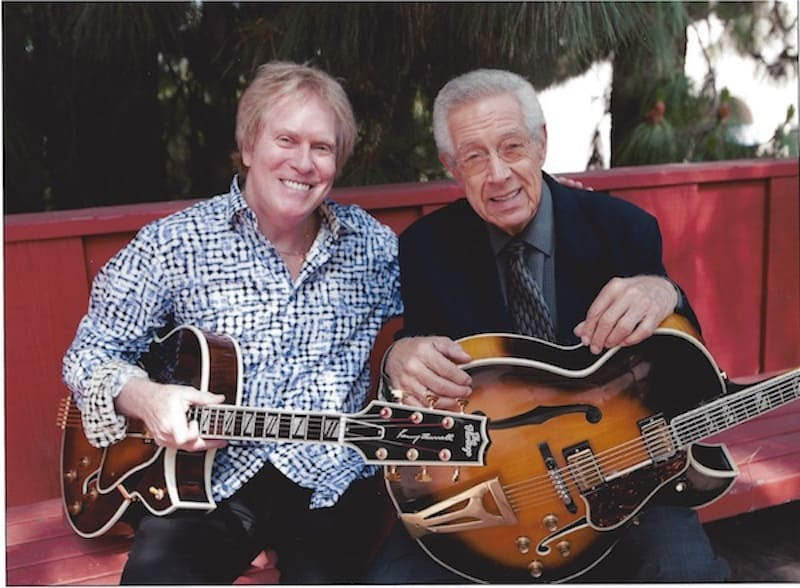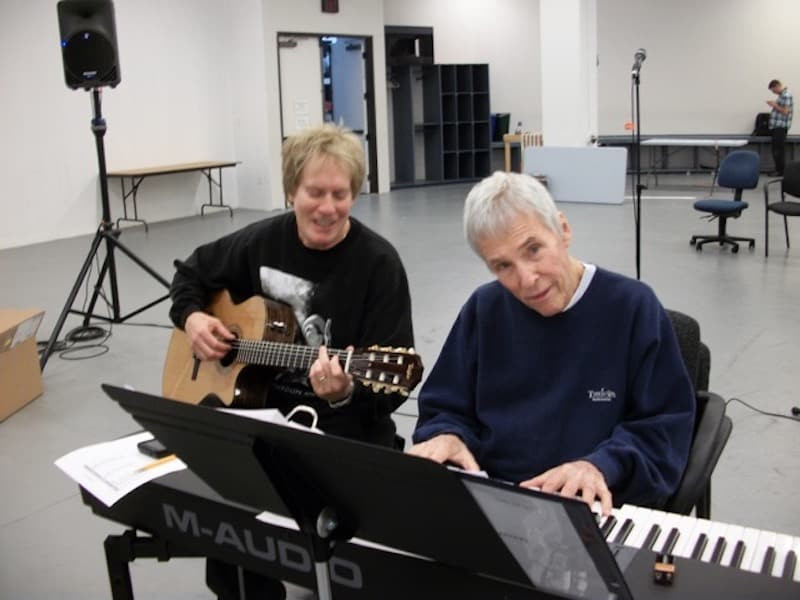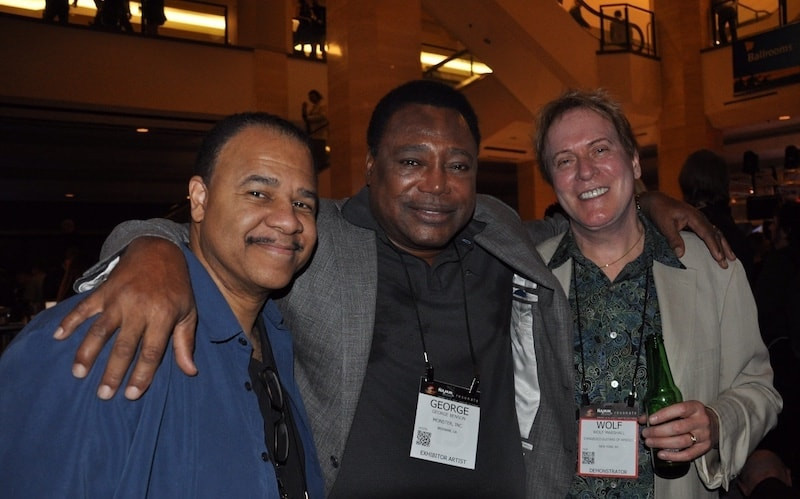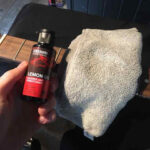Wolf Marshall stands as a towering figure in the world of guitar, not only as a versatile and accomplished player but also as a leading author and educator who has profoundly impacted generations of musicians. For guitar players across the globe, the name Wolf Marshall is synonymous with insightful instruction and deep musical understanding.
In 2006, Just Jazz Guitar magazine featured an extensive interview with Mr. Marshall, exploring his multifaceted career. Now, years later, Jazz Guitar Today revisits this influential artist to discover what he has been up to and to further illuminate the journey of this exceptional six-string innovator. This update, provided by JGT Contributor Mark Stefani, delves into Marshall’s recent endeavors and offers a fresh perspective on his enduring legacy in the guitar world.
From UCLA Jazz Faculty to Trio Performances: A Decade of Musical Growth
In 2007, Wolf Marshall embarked on a significant chapter in his educational career by joining the jazz department at UCLA. This prestigious appointment came through the invitation of Kenny Burrell, the head of Jazz Studies at UCLA. Marshall recounts, “I got involved through Kenny Burrell… We’d known each other for a few years professionally and he asked me to participate and co-plan a segment of his 75th Birthday Concert at Royce Hall.” This initial collaboration blossomed into a lasting relationship with UCLA, where Marshall became a faculty member.
He fondly remembers the 75th Birthday Concert as a “once-in-a-lifetime experience,” particularly the performance of “Chitlins Con Carne” featuring an ensemble of seven jazz guitarists including Pat Metheny and Russell Malone. This unique event, which even garnered attention from Variety, solidified Marshall’s connection with UCLA. Shortly after, Burrell, recognizing Marshall’s extensive educational background, invited him to join the esteemed jazz faculty. UCLA, renowned as one of the nation’s best music schools, boasts faculty members like Herbie Hancock, Wayne Shorter, and Ron Carter, and hosts guest lecturers such as Benny Golson and Christian McBride. Marshall notes the program’s expansion into the Global Jazz Studies program and the addition of Terence Blanchard, further enhancing its prestige.
 Wolf Marshall with Kenny Burrell at UCLA in 2013
Wolf Marshall with Kenny Burrell at UCLA in 2013
Reflecting on his relationship with Kenny Burrell, Marshall speaks with deep admiration. “It’s a dream come true,” he states, describing Burrell as his “earliest jazz guitar idol and a role model.” This admiration dates back to Marshall’s formative years, when Burrell’s playing served as a “perfect musical bridge from my blues background to jazz.” Their professional relationship began during Marshall’s research for his Wes Montgomery book/CD project in 2001. During this time, Burrell shared insights into Wes Montgomery’s life and even revealed the little-known fact that Montgomery borrowed Burrell’s guitar and amp for his first New York leader session. According to Marshall, “that was Kenny’s guitar and amp heard on tracks like ‘Round Midnight,’ ‘Missile Blues, and ‘Yesterdays’—surprising because most listeners assume it Wes’ usual L5 guitar, not Kenny’s L7 with Charlie Christian pickup and a tweed Fender Deluxe amp.”
Their collaboration extended beyond research into teaching at UCLA together. Marshall cherishes the impromptu lunches and office visits with Burrell, recalling instances where Burrell would spontaneously join his student sessions, offering invaluable insights. “Imagine Kenny Burrell walking into your guitar lesson and sharing his insights!” Marshall exclaims, emphasizing the inspirational nature of such moments. He highlights the real-life training and apprenticeship offered by Burrell’s presence in combo classes and student recitals. Performing with Burrell, especially during a concert featuring “Sunset Time” with the Jazz Unlimited Orchestra and vocalist Dee Dee Bridgewater, with Stevie Wonder and B.B. King in the audience, remains a surreal and inspiring highlight for Marshall. He vividly remembers Burrell’s spontaneous decision to have him play a guitar solo during the performance, a moment he revisits with great fondness.
In 2009, another significant musical chapter began for Marshall with the formation of the Wolf Marshall Trio. After years of studio work, producing audio tracks for books and major companies, Marshall felt a strong pull to return to live performance, specifically within a jazz band context. He credits jazz guitarist Henry Johnson for planting this idea as early as 1998, encouraging him to return to the live music scene. Sheryl Bailey also played a pivotal role, unknowingly, in setting this in motion. Marshall recounts playing a set with Bailey in San Diego in 2007, an experience he found immensely joyful. He describes Bailey as “brilliant and an inspiration,” noting their shared admiration for Pat Martino, which led to them playing “The Visit” and an Afro-Cuban rendition of “Stella By Starlight.”
This performance led to Marshall meeting drummer Roger Karlsson and bassist Don Skelton, who would become integral to his trio. When Karlsson recommended him for a house band gig at the Bluefire Grill in the La Costa Resort, Marshall saw it as an opportunity to play live regularly. The house band, led by saxophonist Brad Rambur, played a mix of jazz styles. After a couple of years, this steady gig provided the platform for Marshall to form his own group, focusing on his beloved soul-jazz style. He teamed up with B3 organist Jack Hill and drummer Roger Karlsson, both from the house band. As the Wolf Marshall Trio, they performed blues, straight-ahead jazz, bossa novas, American Songbook standards, hard bop, and soul-jazz every Friday night, while Marshall continued with Brad’s more commercial band on Saturdays.
 Wolf Marshall working with Burt Bacharach at the Old Globe Theater in San Diego, 2011
Wolf Marshall working with Burt Bacharach at the Old Globe Theater in San Diego, 2011
The Wolf Marshall Trio transitioned from the Bluefire Grill to various major venues in the area, including Twenty20 and Vivace, as well as private events and clubs. Informal recordings of many of these performances can be found on YouTube, offering a glimpse into the trio’s dynamic sound. Marshall highlights a special connection with NAMM’s Museum of Making Music in Carlsbad, which led to several memorable performances, including the museum’s grand reopening. At this event, Larry Graham of Sly and the Family Stone praised the trio, noting their resemblance to the organ trio of Kenny Burrell and Jimmy Smith—high praise indeed. Another notable NAMM-related performance was on San Diego’s morning TV show, requiring a 5 AM set-up for a jazz performance, a testament to the trio’s dedication.
Collaborating with Burt Bacharach: A Unique Musical Education
In 2011, Wolf Marshall received a personal call from Burt Bacharach, inviting him to collaborate on a six-week holiday performance. This collaboration was a particularly exciting experience for Marshall, who had long admired Bacharach’s music since the 1960s. Having played Bacharach’s tunes like “Look of Love,” “Wives and Lovers,” and “Alfie” with his trio, the opportunity to work directly with the legendary composer was surreal. Bacharach, known for typically working through contractors and using set arrangements, took a different approach for this project. He was composing new music for a show titled “Some Lovers,” his first full-length show since “Promises, Promises” in 1968. This new show featured previously unheard music and involved top New York performers, a stellar music director, and a legendary orchestrator.
Bacharach required a diverse range of guitar styles for the show, including pop, jazz, rock, Brazilian, R&B, orchestral, and light classical. Marshall fondly recalls a one-on-one session with Bacharach after a rehearsal, where they meticulously worked on a guitar part. “It was very special to be sitting next to a man I consider a genius and tweaking the arrangement of a classical/jazz/pop piece called ‘Hush’ based on his feedback and suggestions,” Marshall recounts. This intimate collaboration, with Bacharach at the keyboard and Marshall with his guitar, was “illuminating, instructive and inspiring.” They focused on developing phrases, refining voicings, arpeggiation styles, and chord textures to meet Bacharach’s vision for “Hush,” the show’s emotional closing number featuring solo voice and nylon-string acoustic fingerpicking.
Marshall was deeply impressed by Bacharach’s musical sensibilities, craftsmanship, and personal qualities. He observed that Bacharach had an exceptional ability to bring out the best in those he worked with, fostering a desire to please him through performance. This, Marshall believes, is a key factor in Bacharach’s remarkable career success.
Global Guitar Education in the Digital Age
Like many educators today, Wolf Marshall has embraced technology to extend his reach. He has been teaching students worldwide via Skype and Zoom for over a decade, finding it to be a “wonderful medium” particularly well-suited for guitar instruction. He notes that while students previously relied on static VHS tapes or DVDs for visual learning, online conferencing offers real-time, interactive instruction. This technology allows him to connect with students “all over the world who are thirsting for the kind of language-based instruction, that’s been missing from the usual academic circles or online tutelage.” The ability to instantly send PDFs and record demonstrations further enhances the learning experience, making online platforms an “quintessential multi-media format for learning.” Marshall has students across the United States and in countries like England and Australia, demonstrating the global reach of his instruction. He also utilizes these technologies to provide UCLA students with supplementary material beyond traditional classroom time.
Authoring Groundbreaking Guitar Education Resources
Wolf Marshall’s contributions to guitar education extend beyond teaching to his influential publications. His work on “Giant Steps for Guitar” and his volumes dedicated to jazz icons are particularly notable and have received high praise from fellow musicians. Marshall explains that the “Giant Steps for Guitar” project was a decade-long endeavor, born from his desire to demystify and simplify the approach to improvising over Coltrane’s challenging composition. He aimed to create a resource that would “un-complicate and de-mystify the approach to improvisation and to foster a general guitaristic understanding of the harmony and progressions.”
His teaching experience revealed that many guitarists struggled with the chord changes and modulations in “Giant Steps.” Marshall’s approach involved collecting language phrases from his favorite players and applying them to “Giant Steps,” emphasizing the “assimilation stage” of learning. He encourages students to blend specific Coltrane phrases with their existing musical vocabulary, creating personalized approaches to improvisation. He highlights the effectiveness of rhythmic and thematic elements from diverse sources, often overlooked in traditional approaches. For example, he suggests using a syncopated rhythm on a repeated common tone to connect chord changes, offering a contrast to linear chord outlining.
 Wolf Marshall at NAMM 2015 with George Benson and Henry Johnson
Wolf Marshall at NAMM 2015 with George Benson and Henry Johnson
Currently, Marshall is involved in two significant educational projects: a series with TrueFire and a comprehensive jazz guitar course for Hal Leonard. His TrueFire series focuses on “the acquisition of language via transcribing and how to assimilate it, transform it and then apply into into useful repurposed material for your own playing,” and “the exploration of key language lines on the fingerboard and how to expand the melodies into valuable connections for improvisation.” He emphasizes the importance of musical language and its manipulation in developing personal playing styles.
His jazz guitar course for Hal Leonard aims to be a “thorough and practical method, again language-based,” focusing on material that is gig-ready, as Joe Pass would say. The course will cover harmony, rhythm, melody, improvisation, and functional theory, drawing from the key elements Marshall has learned from his heroes and other instrumentalists. He envisions it as a user-friendly volume with audio and video support, bringing together essential jazz guitar concepts in a practical and accessible format.
Wolf Marshall’s career is a testament to his dedication to both performance and education. His ongoing projects promise to further enrich the landscape of guitar education, solidifying his legacy as a leading voice in the guitar world. His insights and methods continue to inspire and guide guitarists at all levels, ensuring his enduring influence for years to come.

